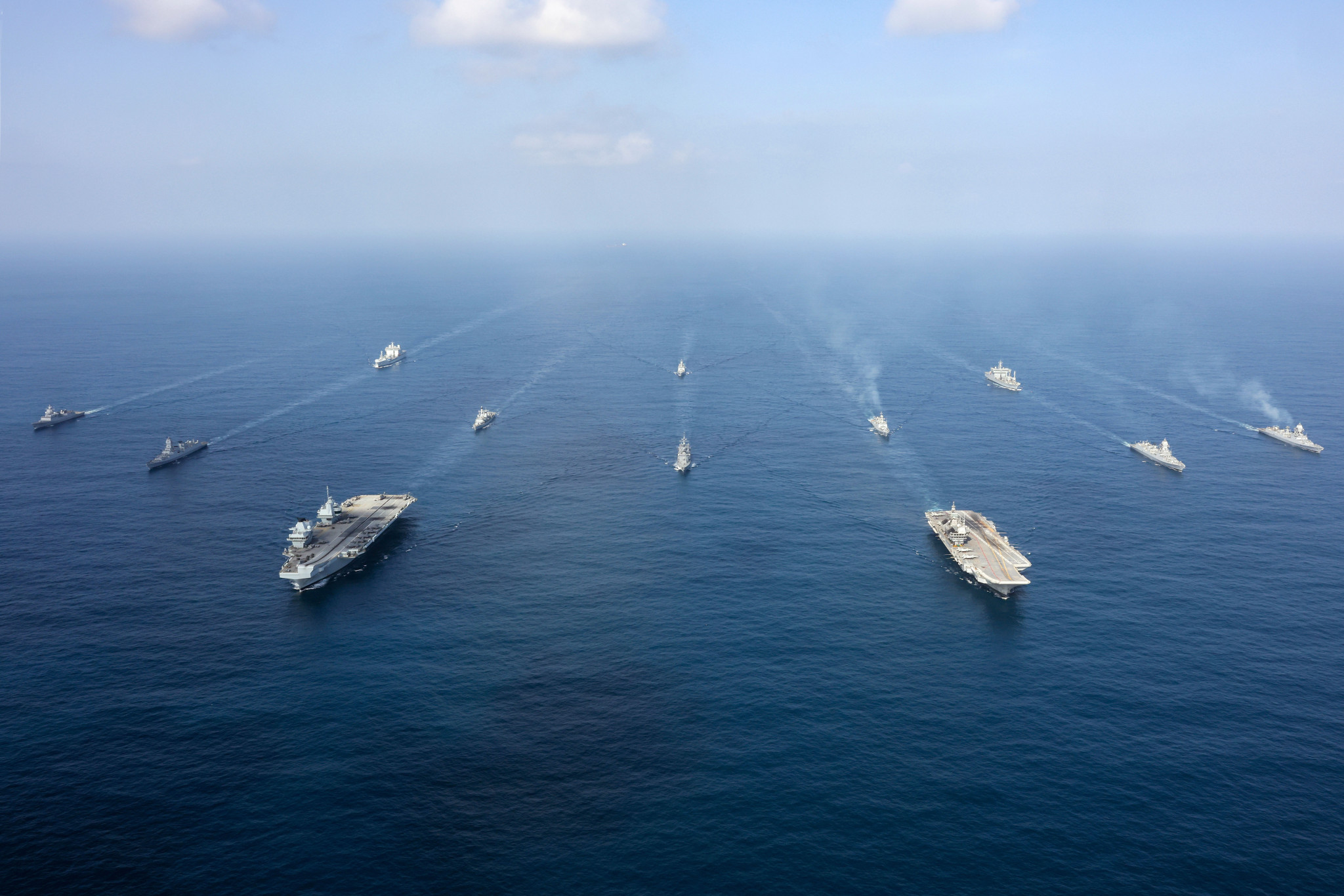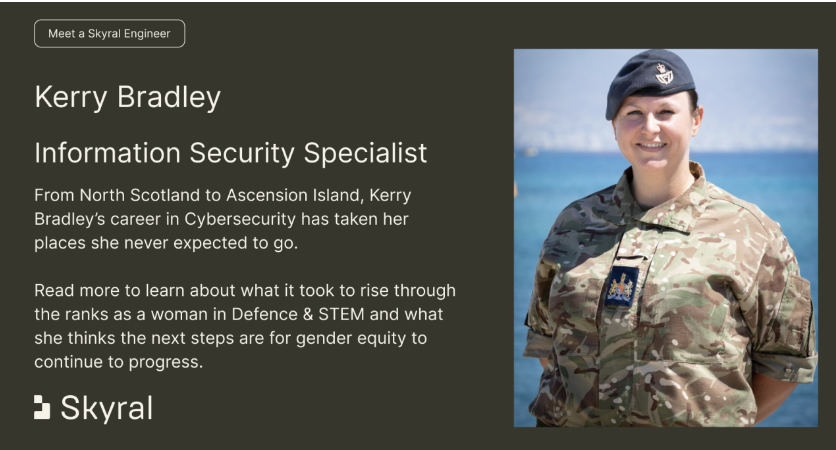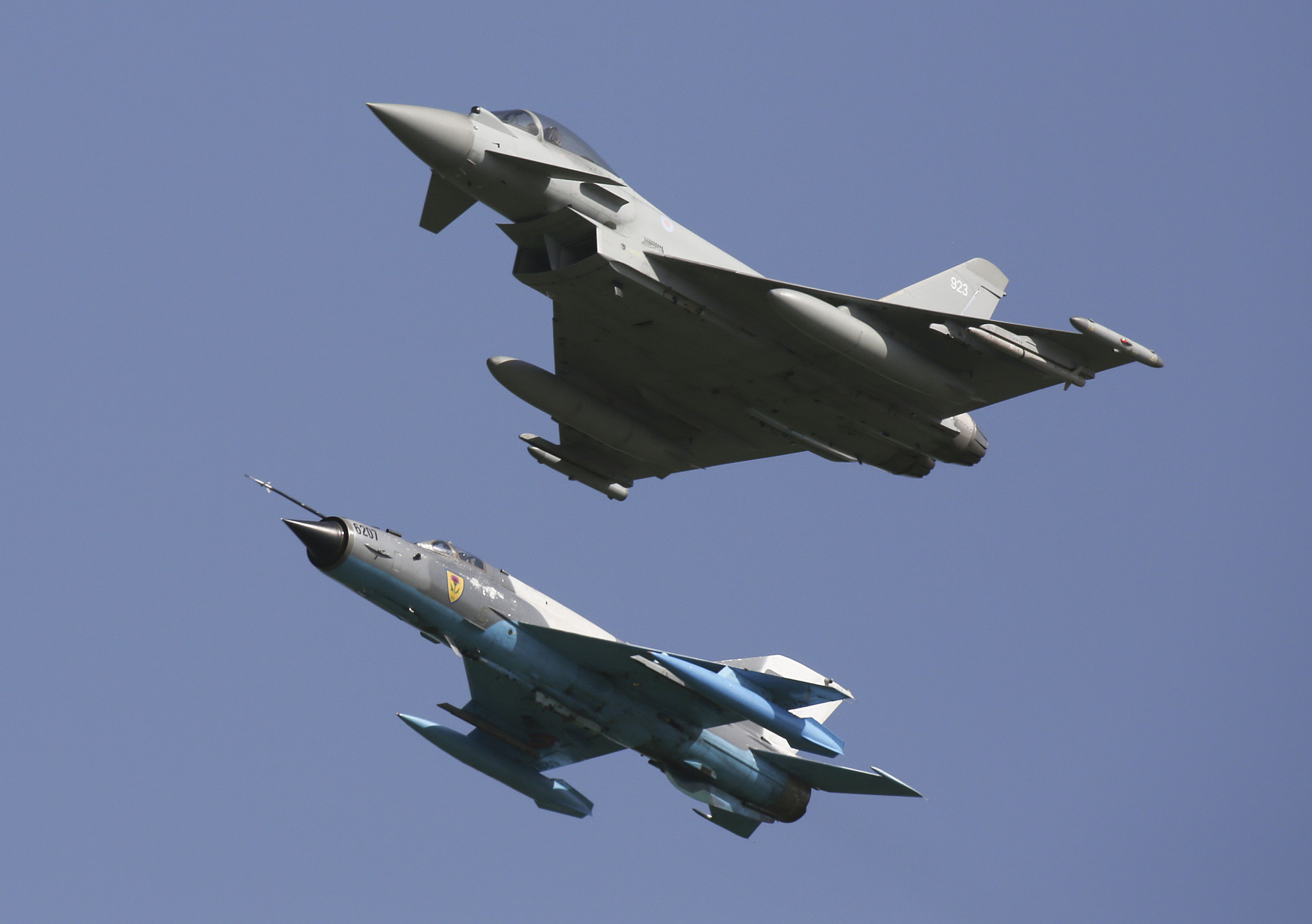
Naomi Hulme
Skyral People Team

Kerry Bradley is Skyral’s Information Security Specialist. In addition to serving over 20 years in the Royal Air Force, Kerry has received two Queen’s commendations for meritorious service in leadership and management and was nominated for the IET Young Woman Engineer of the Year award.
Q: Tell us a little bit about yourself and why you joined the Royal Air Force?
I have always found it uncomfortable to talk about myself; it makes me feel weird! I much prefer to sing the praises of others! However, I’m aware that sometimes I need to step outside my comfort zone and face things not only to grow but to make positive changes, for myself and for others.
When I joined the Royal Air Force at 19 years old it was incredibly daunting. I had no idea what I was about to face, but I was intent on pursuing something extraordinary and different. Qualifying as a Telecommunications Operator back in 2000, my first posting to North Scotland was 700 miles away from home. But even being this far away from family is when I realised that it was up to me to make the most out of every opportunity.
My journey in the RAF took me to places all over the world. Adventurous training involved skiing in France, white water rafting in Bavaria, diving in Ascension Island, and much more. Deployed operations took me to several places across the Middle East, Europe and the US, but I somehow managed to escape the Falkland Islands (preferring sunnier climates!).
It’s hard to cram a rewarding, challenging, and successful 22 year military career into a blog; there have been so many awesome experiences and proud moments. Meeting my husband all those years ago in North Scotland and having two children together is certainly one of the rewarding ones, but also leaving them behind to repeatedly deploy on operations for 4-6 months and supporting him while he did the same, was also one of the most challenging ones.
Q: How did your experience as a Telecommunications Officer change with the advent of new technologies being used in the Armed Forces?
As technology evolved, my seemingly non-technical trade merged with a technical one, as I began to work with Information Communications Technology, and eventually incorporated Cyberspace. This was a significant step forward allowing me to both appreciate the developments in the information security world, but also seize a new opportunity, and a burgeoning field, and make it my own.
I was fortunate to join a trade that transformed from typing signals in a communications centre to a technical role involving computer repair, maintenance, and network support. Reflecting on my early career, I realised that stamping signals with classification stamps marked the beginning of a 24-year journey dedicated to protecting systems and information, a path that would become more technical over time.
Q: How did you decide you wanted to leave the RAF? What was your transition to civilian life like?
I decided to leave the RAF because I wanted a new challenge and to pursue a second career in my passion of cyber security. I specifically chose information security because I’d been accumulating knowledge and skills in this area for most of my RAF career. I wanted to continue to use my experience and knowledge from the RAF to make a difference in the security culture of any organisation I went to.
My transition from the RAF to civilian life felt as daunting as the day I joined up, but the support I received from the veteran network and the company I first joined was fantastic and I will always be truly grateful for how they enabled me to adjust and settle into the civilian world and learn about the private sector.
Now in my second role post RAF, working for Skyral as their Information Security Manager, I am further driven to inspire and support women in cyber security, but also driven to continuously learn more about a seemingly infinite, ever changing security landscape and make positive contributions to Skyral and the profession.
Q: What was it like being in the RAF as a woman at that time?
Being in the RAF, coupled with being in a technical trade, meant I was always working in a male-dominated environment where I felt I needed to constantly prove my abilities, not because I was a woman, but because I knew I was capable of achieving what my peers and superiors could.
Like many of my counterparts, I most definitely faced adversity along the way and there were times where unfortunately that adversity was gender-based. But, as a naturally competitive person, I saw it as a challenge and tried to learn and grow from each experience.
Q: How have you personally supported gender equity and inclusion in the RAF and beyond?
I made it my mission to mentor as many people as I could. I thrived on helping them advance in their careers, encouraging them to harness their own abilities to achieve their goals and increase their confidence to the benefit of the individual, the team, the trade, and ultimately the RAF.
When I achieved the rank of Warrant officer after only 19 years, I was incredibly proud, not only because I’d accomplished goals, but because I had also surpassed my own expectations. My rapid promotions allowed me to experience and understand various leadership and management styles, ultimately shaping my own approach. This journey inspired me to become a STEM ambassador, where I led activities in girls schools. I wanted to inspire girls and young women by using my achievements as an example to promote STEM careers. I aimed to show it was possible to be technical, to be a leader, and to have a family if you chose to.
Q: Based on your experience, how do you think the Defence and STEM fields can continue to drive toward gender equity?
I’m immensely proud of my journey as a woman in the armed forces and now as a veteran working for a company with a Defence business, but also building into other markets. It’s inspiring to witness the growing STEM opportunities for women both within and outside of Defence, as they are being positively promoted and celebrated every day. However, there is always something to progress further.
To continue advancing opportunities for women in STEM, we should focus on educating children early about equity, diversity and inclusion, and emphasise how there are no barriers to achieving that which we are truly passionate about.

Naomi Hulme

Lee Doherty

Naomi Hulme